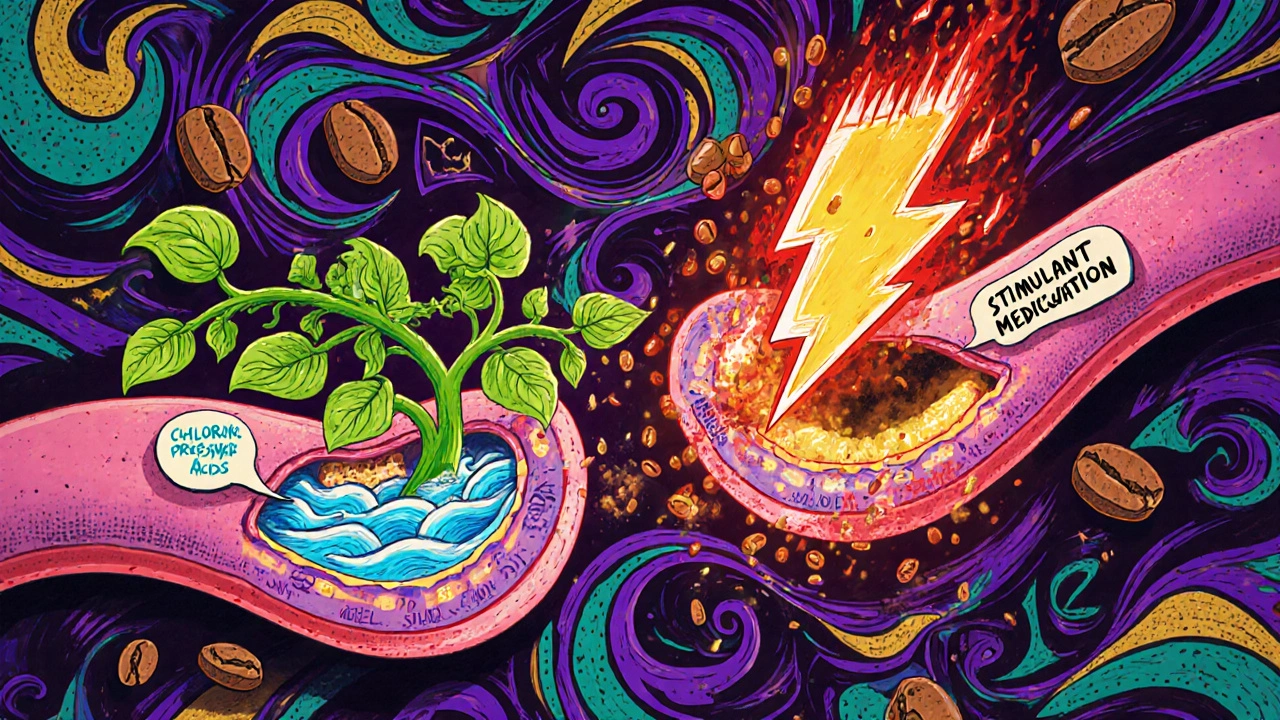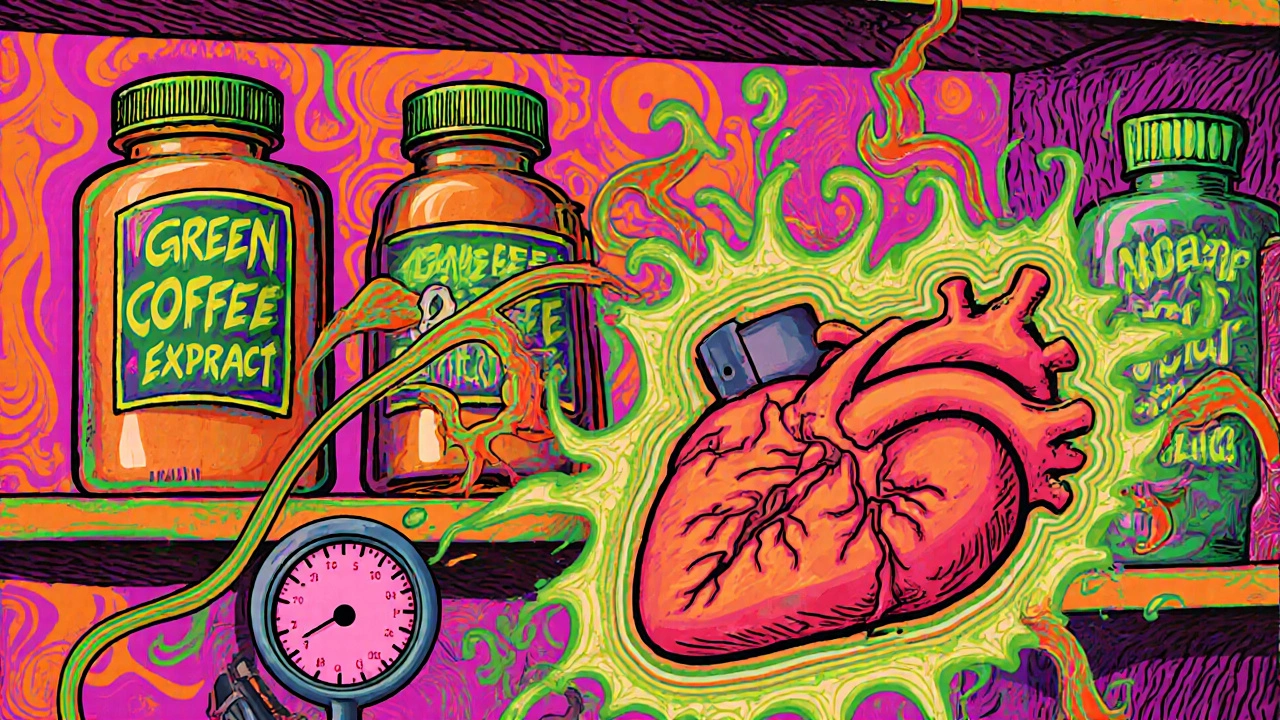Green Coffee Extract and Stimulant Medications: What You Need to Know About Blood Pressure Risks

Blood Pressure Risk Calculator
How This Calculator Works
This tool estimates the potential blood pressure changes when combining green coffee extract with stimulant medications. Based on clinical studies, green coffee extract can lower blood pressure by 3-5 mmHg, while stimulants like Adderall can raise systolic pressure by 2-13 mmHg. The combination creates instability that can put you at risk.
Blood Pressure Risk Assessment
When you take a stimulant medication like Adderall or Vyvanse for ADHD, you’re already managing a delicate balance in your body. These drugs work by boosting dopamine and norepinephrine, which helps with focus - but they also nudge your blood pressure upward. Now imagine adding a popular supplement like green coffee extract to the mix. It’s marketed for weight loss and antioxidant benefits, but what’s really happening inside your bloodstream when these two meet?
What Is Green Coffee Extract?
Green coffee extract comes from unroasted coffee beans - the same beans that eventually become your morning brew. But instead of roasting them, manufacturers dry and process them to pull out key compounds, mainly chlorogenic acids and caffeine. Unlike roasted coffee, where heat breaks down many of these acids, green coffee extract keeps them intact. That’s why it’s sold as a supplement: you get the benefits of chlorogenic acids without the strong flavor or full caffeine punch of brewed coffee.
Most supplements contain between 45% and 50% chlorogenic acids, with caffeine levels ranging from 5% to 20%. A typical 400 mg capsule might have 20-80 mg of caffeine - sometimes more, depending on the brand. That’s not much compared to a cup of coffee (which has 95-200 mg), but when you’re already on a stimulant, every milligram counts.
Studies show green coffee extract can actually lower blood pressure. A 2006 trial with 117 men with mild high blood pressure found that taking 93 mg or 185 mg of the extract daily reduced systolic pressure by nearly 5 mmHg and diastolic by about 3-4 mmHg. That’s a meaningful drop - similar to what some blood pressure medications achieve. The mechanism? Chlorogenic acids seem to block enzymes that tighten blood vessels, helping them relax. Caffeine, on the other hand, does the opposite - it constricts vessels and raises pressure. But in green coffee extract, the relaxing effect wins out at normal doses.
How Stimulant Medications Affect Blood Pressure
Stimulants like methylphenidate (Ritalin, Concerta) and amphetamines (Adderall, Vyvanse) are designed to stimulate the central nervous system. That’s why they improve attention and reduce impulsivity. But they also trigger your body’s fight-or-flight response. Your heart beats faster. Your blood vessels tighten. Your blood pressure rises.
According to FDA data, methylphenidate can raise systolic pressure by 2-11 mmHg and diastolic by 1-9 mmHg. Amphetamines push it even higher - up to 13 mmHg systolic and 8 mmHg diastolic. These aren’t minor changes. For someone with borderline hypertension, this could push them into the hypertensive range. That’s why the American Heart Association recommends regular blood pressure checks for anyone on these meds.
It’s not just about the numbers. Fluctuations matter too. If your blood pressure swings wildly - from normal to high and back again - your heart and arteries are under constant stress. That increases long-term risk for heart attack, stroke, and kidney damage.
The Real Problem: Opposing Forces in Your Body
Here’s where things get tricky. Green coffee extract lowers blood pressure. Stimulants raise it. On paper, they seem to cancel each other out. But your body doesn’t work like a math equation.
When you take both, you’re creating a tug-of-war inside your cardiovascular system. One side pulls down. The other pulls up. The result? Unstable readings. One day your pressure is normal. The next, it spikes. You might feel dizzy, have heart palpitations, or notice your usual medication isn’t working as well.
A 2021 case report in the Journal of Clinical Hypertension described a 34-year-old man on Adderall XR who started taking a green coffee extract supplement with 180 mg of caffeine. His systolic pressure jumped between 118 and 156 mmHg - unpredictable, dangerous swings. He had to stop the supplement and adjust his ADHD meds to get stable.
It’s not just caffeine. Chlorogenic acids also interfere with enzymes that regulate blood pressure - the same ones targeted by ACE inhibitor drugs. So even if your supplement has low caffeine, the chlorogenic acids alone can mess with how your body responds to stimulants.

Real People, Real Consequences
It’s not just clinical studies. Real users are reporting problems.
On Reddit’s r/ADHD, someone wrote: “I started green coffee extract for weight loss while on Vyvanse 50 mg. My blood pressure readings went crazy - sometimes normal, sometimes hypertensive. My cardiologist said to stop it immediately.”
Another user on PatientsLikeMe described dizziness and heart flutters after combining Adderall 20 mg with green coffee extract. Their doctor confirmed: “The caffeine in the supplement was likely amplifying the stimulant’s effects.”
ConsumerLab’s 2023 safety report flagged 17 blood pressure-related adverse events tied to green coffee extract. Nine of those cases involved people also taking stimulant medications. That’s more than half.
And it’s getting worse. Between 2020 and 2023, reports to the FDA’s adverse event database mentioning “green coffee extract” and “blood pressure” jumped 217%. Over 40% of those reports involved stimulant meds.
Why Supplement Quality Matters
Not all green coffee extract is created equal. ConsumerLab tested 15 popular brands in 2023 and found chlorogenic acid content varied from 28.7% to 51.3%. Caffeine levels? From 3.2% to 18.7%. That means two capsules from different brands could have wildly different effects.
One brand might give you 40 mg of caffeine. Another might give you 150 mg - all labeled as “500 mg green coffee extract.” There’s no standard. No regulation. You’re guessing.
And if you’re taking other sources of caffeine - energy drinks, pre-workout powders, even dark chocolate - you’re stacking the deck. The American Pharmacists Association warns that combining stimulant meds with GCE can easily push daily caffeine intake over 300 mg. That’s the threshold where cardiovascular risks rise sharply, especially in sensitive people.

What Doctors Are Saying
Experts are raising red flags.
Dr. James Lane from Duke University says: “The combination of prescription stimulants with additional stimulatory compounds like caffeine in green coffee extract creates unpredictable hemodynamic responses that can compromise treatment efficacy and patient safety.”
The American Society of Hypertension’s 2022 position paper specifically warns against mixing blood pressure-altering supplements with prescription meds. They point out chlorogenic acids can interact not just with stimulants, but also with antihypertensive drugs - creating even more complex risks.
Dr. Christopher V. Granger, co-author of the American Heart Association’s ADHD medication guidelines, says: “We’re seeing increasing cases of blood pressure lability in patients combining prescription stimulants with multiple caffeine sources, including green coffee extract supplements. It confounds proper dosing and makes hypertension management nearly impossible.”
And it’s not just opinions. A July 2024 survey of 1,200 pharmacists showed that 68% now routinely warn patients about this interaction - up from just 32% in 2021.
What Should You Do?
If you’re on a stimulant medication and thinking about trying green coffee extract - stop. Don’t start.
If you’re already taking both, talk to your doctor. Don’t quit cold turkey. Sudden withdrawal from either can cause rebound effects - your blood pressure might crash or spike even more.
Your doctor might recommend:
- Stopping the supplement entirely - this is the safest route.
- Switching to decaffeinated green coffee extract - but even then, chlorogenic acids remain a concern.
- Monitoring your blood pressure twice daily for two weeks - keeping a log to show your doctor.
- Checking your caffeine intake from all sources - coffee, tea, soda, energy drinks, chocolate.
The European Society of Cardiology’s 2023 guidelines suggest keeping blood pressure below 140/90 mmHg with no more than 10 mmHg variation day-to-day. If you’re seeing bigger swings, it’s a sign your body is struggling.
The Bottom Line
Green coffee extract isn’t dangerous on its own. Stimulant medications aren’t dangerous on their own. But together? They create a pharmacological minefield. Your blood pressure becomes unstable. Your medication loses predictability. Your risk of heart strain goes up.
There’s no large-scale study proving exactly how often this causes harm - but the evidence is piling up: case reports, user stories, pharmacist surveys, and regulatory warnings. The American Heart Association’s 2024 update says it plainly: “Patients taking stimulant medications should avoid green coffee extract supplements unless under direct medical supervision.”
Weight loss isn’t worth the risk. Focus on diet, movement, and sleep. Those work without messing with your heart. If you’re struggling with ADHD symptoms, talk to your doctor about adjusting your medication - not adding unregulated supplements.
Your blood pressure is too important to gamble with.
Can green coffee extract lower blood pressure?
Yes, multiple clinical studies show that green coffee extract can lower blood pressure, especially in people with mild hypertension. The active compounds, chlorogenic acids, help relax blood vessels. In one 2006 trial, doses of 93 mg and 185 mg reduced systolic pressure by nearly 5 mmHg on average. However, this effect is dose-dependent and varies by product quality.
Do stimulant medications raise blood pressure?
Yes, stimulant medications like Adderall, Vyvanse, and Ritalin consistently raise blood pressure as a known side effect. Clinical trials show increases of 2-13 mmHg in systolic pressure and 1-9 mmHg in diastolic pressure. This is why the American Heart Association recommends regular blood pressure monitoring for anyone on these drugs.
Is it safe to take green coffee extract with ADHD meds?
No, it’s not considered safe. Combining green coffee extract with stimulant medications creates conflicting effects on blood pressure - one lowers it, the other raises it. This can lead to unstable readings, dizziness, palpitations, and increased cardiovascular strain. Multiple health organizations now advise against this combination unless under strict medical supervision.
How much caffeine is in green coffee extract?
Caffeine content varies widely between brands - from 3.2% to 18.7% of the total weight. A typical 400 mg capsule may contain 15-80 mg of caffeine, sometimes more. Since stimulant medications also contain stimulants, this can easily push total daily caffeine intake over 300 mg, which is linked to higher cardiovascular risk in sensitive individuals.
What should I do if I’m already taking both?
Don’t stop either abruptly. Talk to your doctor. They may recommend stopping the supplement, switching to a decaffeinated version, or closely monitoring your blood pressure twice daily for two weeks. Keep a log of your readings and any symptoms like dizziness or heart palpitations. Your medication dosage may need adjustment.
Are there safer alternatives to green coffee extract for weight loss?
Yes. Focus on proven, safe methods: a balanced diet rich in protein and fiber, regular physical activity, adequate sleep, and stress management. These approaches support weight loss without interfering with your medication or putting extra strain on your heart. Avoid unregulated supplements that claim to boost metabolism or burn fat - they often contain hidden stimulants.
Until more definitive research is available - like the ongoing NCT05678901 trial expected in 2026 - the safest choice is clear: avoid green coffee extract if you’re on stimulant medication. Your heart will thank you.
Adam Dille
November 14, 2025 AT 22:28Katie Baker
November 15, 2025 AT 11:29John Foster
November 17, 2025 AT 01:08Edward Ward
November 18, 2025 AT 11:13Andrew Eppich
November 19, 2025 AT 11:13Jessica Chambers
November 21, 2025 AT 10:11Shyamal Spadoni
November 21, 2025 AT 22:37Ogonna Igbo
November 22, 2025 AT 15:24BABA SABKA
November 23, 2025 AT 22:50